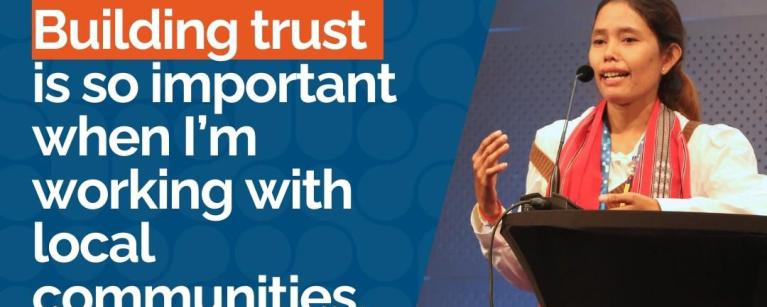Many Veng, is a river defender from Ratanakiri province, working with Oxfam’s partner, the 3S rivers protection network. At the World Water Week 2024 in Sweden, Many participated in panels focused on inclusive water management and revitalization of indigenous matriarchal roles in water leadership. Her contributions highlighted the importance of indigenous women’s leadership, traditional values of water within indigenous communities, and the need for collaborative action to address the challenges posed by climate change. Check out her experience below!
When I learned I had to go to Stockholm, Sweden, I felt overwhelmed and anxious about obtaining a visa. I first shared the news with my aunt Nangnoy and my mother and told the rest of my team a week later. Oxfam contacted me about interviewing for the visa at the Swedish Embassy in Phnom Penh, I was scared of facing difficult questions, especially in English, and worried about wasting Oxfam’s money if I failed.
On August 7, the embassy requested I pick up my passport the next day. Anxious, I contacted my agent who assured me he’d handle it. The following day, I learned my visa was approved. Overjoyed, I shared the news with Oxfam and 3SPN teams, confirming my departure date of August 22nd.
World Water Week is vital for indigenous women, leaders, and communities worldwide to connect, share their voices, and express their challenges, cultures, and beliefs.
I felt privileged to share my tribe’s culture and history, as well as community issues, with new audiences. Despite meeting new people, I felt respected and safe to express my opinions. The warmth and encouragement from the larger indigenous group inspired me, and I appreciated their acknowledgment of my contributions.
During World Water Week, I felt a strong sense of connection, even with language barriers, thanks to excellent interpretation. The friendly moderators and panelists, dressed in their unique styles, eased my nerves and made me comfortable on stage.
In recent years, my community has felt the impacts of climate change. Flooding has devastated our agricultural crops, reducing our rice harvest from 30-40 sacks to just 3. This decline has led to food shortages, forcing family members to migrate for work in other provinces, taking jobs in farming and construction to support us. It pains me to see my aging parents working so hard just to feed the family.
My curiosity to learn has motivated me to grow. Attending seminars and training has shown me the importance of education in mobilizing and encouraging community members, especially young people in remote areas, to value and protect our local resources.
In 2012, I completed 9th grade but decided to drop out of school to work on the farm with my family. That June, my older brother, Yen Bora, head of the community-based organization in Vensai District, invited me to volunteer as an assistant for the Fishery Community. Initially, I didn’t understand the role and hesitated, but he explained it, and I decided to join.
At first, I felt embarrassed and compared myself to others, often engaging in negative self-talk.However, with support from Aunty Foy Soth, a senior women leader in the community who spoke my indigenous language, I began to feel more at ease. When I first joined as a speaker, I was afraid I wouldn’t perform well and doubted my abilities. However, after participating several times, my fear faded, and I now feel proud of my progress. I never imagined I would have the opportunity to travel abroad, let alone to Europe.
My family and villagers are thrilled with my achievements and often encourage their children to follow my example. At dinner one night, my mom asked how I liked Sweden. I told her I enjoyed seeing people walk instead of drive, like we do to the farm. I shared that their food included bread, coffee, vegetables, fruits, fish, and meat. She wondered how they felt full of just that, and I chuckled, explaining that it was their daily diet, just like rice and noodles are for us. I also told her I spent a total of 13 hours on the plane, mostly sleeping until we arrived at our destination.
